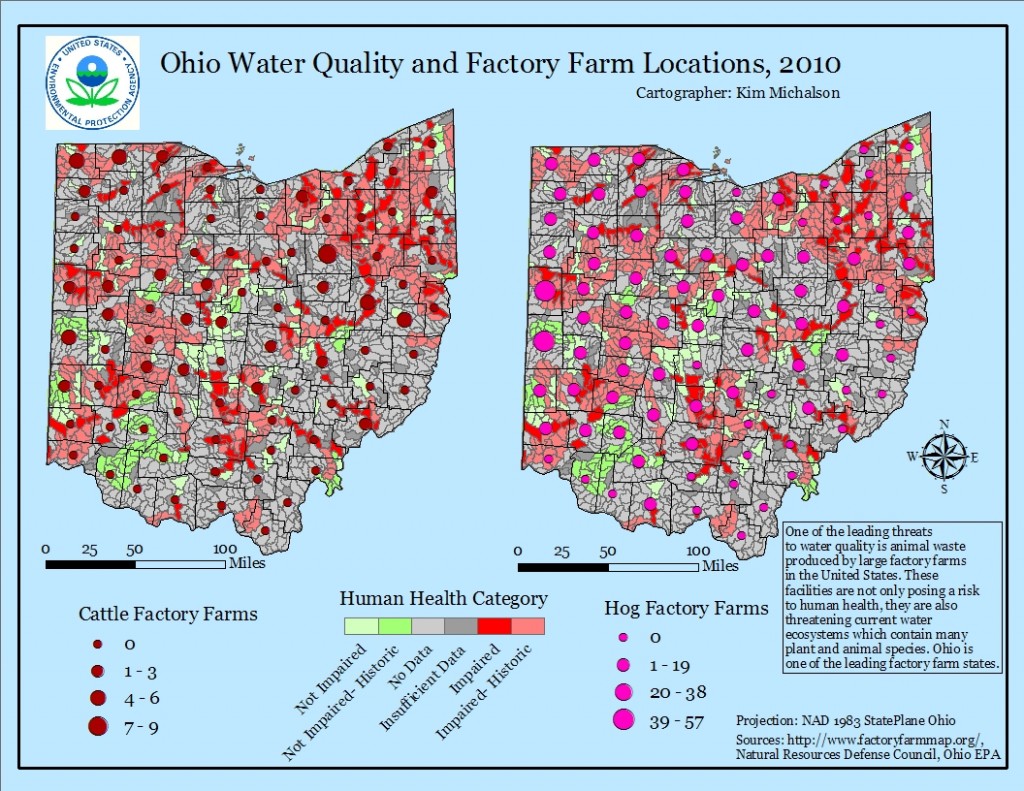by Sean Butler and Will Falk / Featured image: an aerial photograph showing harmful algae blooms in Lake Erie in August of 2017. These are believed to be caused by the effluent runoff from factory farms in the watershed. Public domain photo by NOAA.
Rights of nature advocates often repeat the words, “The structure of the legal system makes meaningful environmental protection illegal.” It’s a bold claim, but for most people it’s too vague to mean anything. Most folks (understandably) don’t know the difference between a federal district court and a circuit court of appeals, let alone what we mean by the “structure” of the legal system.
But it’s actually quite simple. We’re referring to two aspects of the American legal system: (1) laws and regulations at the federal, state, and local (city and county) levels and the relative hierarchy among them; and (2) the holdings of various state and federal courts throughout the history of our country, which establish “precedent” for what those laws and regulations actually mean.
Perhaps nowhere in recent memory has the “structure of the legal system” been laid bare more clearly than in the aftermath of the passage of the Lake Erie Bill of Rights by the citizens of Toledo, OH in February 2019. The Lake Erie Bill of Rights (LEBOR) grants Lake Erie the rights to exist, flourish, and naturally evolve; grants the residents of Toledo a right to a healthy environment; and “elevates the rights of the community and its natural environment over powers claimed by certain corporations.”
Although remarkable on its face, LEBOR is only one of dozens of similar local laws that have been passed in recent years in cities and counties across the United States. What is truly remarkable is the response LEBOR has received from existing institutions.
Mere hours after the City of Toledo certified LEBOR’s election results, entrenched interests opposed to environmental protection leveraged the existing structure of American law to mount an urgent opposition to LEBOR. Drewes Farms Partnership (“Drewes Farms”), represented by a corporate law firm, sued the City seeking an injunction against enforcing the law on the basis that LEBOR violates Drewes Farms’ “civil rights.” The State of Ohio was allowed to intervene in the case to argue for LEBOR’s invalidation while the grassroots community group, Toledoans for Safe Water – who drafted LEBOR and ushered it through Ohio’s citizen initiative process — was barred from the case by the federal judge. Then, the Ohio State legislature (at the request of the Ohio Chamber of Commerce) included in its 2019 budget a provision explicitly making it illegal for local governments to make or enforce laws ascribing legal rights to nature.
In short, the existing legal system and those who profit from it brought the full weight of the legal system against LEBOR. To really understand what is meant when we say that the structure of the legal system makes meaningful environmental protection illegal we need to dig into the specifics of this onslaught.
LEBOR’s opponents make primarily two legal arguments against it. First, they claim that LEBOR should be invalidated because it infringes on corporate constitutional rights. Second, they argue that LEBOR is preempted by state and federal law that reserves the right of the state of Ohio and the federal government to legislate on environmental matters.
Drewes Farms makes the corporate constitutional rights argument very clearly in the complaint it filed in federal court, claiming that:
“LEBOR causes real and concrete harms on Drewes Farms by violating the United States Constitution including but not limited to:
- Depriving Drewes Farms of its fundamental right to freedom of speech and to petition the courts under the First Amendment;
- Violating Drewes Farms’ right to equal protection by targeting it for liability based solely on the fact that it operates as a partnership business entity;
- Violating the Fifth Amendment protection against vague laws by exposing Drewes Farms to strict criminal liability and massive damages and fines under a standardless Charter Amendment; and
- Depriving Drewes Farms of its rights without due process.”

This 2010 map shows the location of major factory farming operations in Ohio and corresponding water quality readings. Ohio has among the highest density of CAFOs (Concentrated Animal Feeding Operations) of any U.S. state. Map by Kim Michalson.
Just so we’re clear, Drewes Farms, a non-human legal entity, lays claim to rights under the First, Fifth, and Fourteenth Amendments to the US Constitution AND claims that those rights are violated by a law that recognizes nature’s right to exist, flourish, and naturally evolve.
Meanwhile, the State of Ohio, in its Complaint for Declaratory Judgment and Injunctive Relief plainly states that “[t]he Ohio Constitution art. XVIII § 3 does not allow a municipality to enact an ordinance that prohibits regulated activity authorized under state permits issued pursuant to state laws of general applicability.” To support its claim, the State cited a recent Ohio case in which the judge ruled “[s]tate laws with state-wide application preempt local ordinances that discriminate, unfairly impede, or obstruct general laws regulating oil and gas activities.” In other words, the Ohio state constitution itself specifically prohibits any local government to enact laws that prohibit activities that are permitted by state laws.
The fundamental issue with both of these arguments is…they are absolutely, totally, and completely right. Under current American jurisprudence, Drewes Farms does have civil rights under the First, Fifth, and Fourteenth Amendments (among others), and LEBOR does violate principles of preemption.
And that is precisely the problem.
Because American law has long recognized corporate civil rights and has long used preemption to invalidate local laws that provide for stricter regulations than federal or state governments, the State of Ohio and Drewes Farms would have us believe that this should be the end of the discussion. But, ending the discussion here leaves several problematic assumptions unchallenged. Arguing that LEBOR should be invalidated because it infringes on corporate rights only makes sense if corporations should enjoy those rights under our system of law. And arguing that LEBOR should never be enforced because it violates established principles of preemption only makes sense if preemption is beneficial to American citizens.
So, we must dig deeper. We must ask: Why do corporations exist? What are corporate rights? Why does the American legal system afford corporations rights in the first place? We must also ask: Why does preemption exist? Why does the American legal system protect the state and federal governments’ power to preempt laws passed by local communities? And, is there a connection between growing corporate power and preemption?
While there is a debate about what corporations should exist to do, the fact remains that corporations exist to amass wealth, or to borrow one of corporate apologists’ favorite phrases, to “maximize shareholder value.” We can see this argument clearly in the hugely influential essay published in 1970 by the Nobel Prize-winning economist Milton Friedman in The New York Times Magazine aptly-titled “The Social Responsibility of Business is to Increase its Profits.” Environmental author and philosopher Derrick Jensen, in The Culture of Make Believe, is more direct:
“To expect corporations to function differently than they do is to engage in magical thinking. We may as well expect a clock to cook, a car to give birth, or a gun to plant flowers. The specific and explicit function of for-profit corporations is to amass wealth. The function is not to guarantee that children are raised in environments free of toxic chemicals, nor to respect the autonomy or existence of indigenous peoples, nor to protect the vocational or personal integrity of workers, nor to design safe modes of transportation, nor to support life on this planet. Nor is the function to serve communities. It never has been and never will be.”
Wealth is power. This is especially true in the legal system. Many people envision law as an all-powerful list of rules that dictates what someone can or cannot do. Similarly, many people think of rights as a list of privileges that specify what a person is entitled to do or entitled to be free from. As such, many people imagine that they can simply invoke these rights to be safe. But, it is a mistake to think that rules written somewhere in a book of statutes or rights listed in the Constitution have the power to jump off the paper where they are written and enforce themselves.
The key to understanding law and rights lies in understanding how they are enforced. Judges enforce law and rights by making decisions in court. And those decisions in court, in turn, are enforced by the police who are entitled to use physical force to ensure a judge’s decision is adhered to. When most people think about how this works, they envision examples such as President Eisenhower’s use of the National Guard to desegregate schools to uphold African Americans’ Fourteenth Amendment rights. But, a more apt and contemporary example is reflected in how the police were used at Standing Rock. Dogs, water cannons, and military-style weapons were turned against nonviolent protesters once the owner of the pipeline project, a corporation, won a favorable court ruling. These corporate rights-holders harnessed the state’s police power through the courts.

A typical “animal waste lagoon.” These containment ponds continuously leach into groundwater, and often overflow. Public domain photo by NRCS.
Rights, then, are power, too. When shareholders form a corporation, the corporation gains the privilege of “corporate personhood.” Because American courts treat corporations as “persons,” corporations have long exercised rights, including those afforded the highest level of protection under the Bill of Rights’ Contracts Clause, Due Process Clause, Fourteenth Amendment Equal Protection Clause, First Amendment, Fourth Amendment, Fifth Amendment Takings and Double Jeopardy Clauses, Sixth Amendment, and Seventh Amendment.
These rights have, for the most part, been judicially created and have consistently expanded throughout American history. The word “corporation” is found nowhere in the Constitution. Despite this, in 1819, in Dartmouth College v. Woodward, the U.S. Supreme Court ruled that the Contract Clause of the Constitution granted private business corporations protection from governmental interference in internal governance. In 1886, in Santa Clara County v. Southern Pacific Railroad Company, the Supreme Court ruled that a corporation is a person under the law and is therefore entitled to equal protection under the Fourteenth Amendment. In 1922, the Supreme Court ruled in Pennsylvania Coal Company v. Mahon, that coal corporations were entitled to protection under the Fifth Amendment “Takings Clause” and that the government must compensate corporations for property value lost due to mining regulations. In 2010, the Supreme Court ruled that federal laws which limited corporate spending in elections violated corporate First Amendment “free speech” rights in Citizens United v. Federal Elections Committee. Then, in 2014, the Supreme Court, in Burwell v. Hobby Lobby Stores, allowed corporations to deny its employees health coverage of contraception to which the employees would otherwise be entitled because corporations are entitled to First Amendment freedom of religion protection.
This might not seem problematic on its face, but recall that rights only have practical effect to the extent that rights holders can access the courts in order to ask a judge to enforce those rights. Corporations, that exist to, and have grown quite adept at, amassing wealth, have greater means to put behind the legal enforcement of rights. This naturally means more cases won by corporate plaintiffs, more caselaw upholding corporate rights, and therefore, by extension, more caselaw expanding the sphere of corporate civil rights. And the sheer number of cases bear out this reality. As an example, consider this: between 1868, when the Fourteenth Amendment was ratified, and 1912, the Supreme Court ruled on only 28 cases involving the rights of African Americans and an astonishing 312 cases on the rights of corporations, it is easy to conclude that the Fourteenth Amendment has done a better job protecting the rights of corporations than that of African Americans.
At the same time, the expansion of rights in one sphere necessarily produces the curtailing of rights in another. Deep ecologist John Livingston describes the problem:

Effluent discharge pipe. Public domain image from USDA.
“We sometimes forget that every time a court or legislature – or even custom – confers or confirms a right in someone, someone else’s right is nibbled at: the right of women to equal employment opportunity is an infringement of the freedom of the misogynist employer; the right to make a profit is at someone else’s cost; the right to run a motorcycle or a snowmobile reduces someone else’s right to peace and quiet in his own backyard; the rights of embryos impinge upon the rights of the women who carry them. And so on.”
In other words, the expansion of corporate rights shrinks the rights enjoyed by citizens and communities. Because American law extends to corporations many of the same constitutional rights humans enjoy and because corporations exist to accumulate wealth, we should not be surprised when corporations use their power to do exactly that at the expense of the rights of human beings and nature.
The other major legal argument made against LEBOR is that it is preempted by state and federal law. Preemption is a doctrine that says the law of a higher jurisdiction should displace the law of a lower jurisdiction when the two jurisdictions conflict. The American legal system is divided basically into three jurisdictions: federal, state, and local law (local law is a general term for the law of the smallest legislating entities American law allows, entities such as municipalities, cities, or villages). When federal and state law conflict, American courts interpret the Supremacy Clause of the United States Constitution (Article VI, Section 2) to mean that federal law should displace state law. Similarly, state law usually trumps local law when the two conflict.
Corporations, using their superior wealth and their constitutional rights, have found tremendous success in influencing federal and state legislatures, especially pro-business, conservative legislatures and persuading them to enact aggressive new preemption laws. When local governments pass laws with stricter restrictions than the federal or state legislatures, corporations lobby legislatures to employ preemption to attack these local laws. This typically happens in one of two ways. First, government lawyers, primarily attorneys general, assert the doctrine of preemption in court. The State of Ohio’s arguments against LEBOR are a perfect example. Second, legislatures pass legislation known as “blanket” preemption to expressly forbid local ordinances that contradict state law. And, in fact, the Ohio House of Representatives recently employed blanket preemption when it adopted its 2020-2021 budget with provisions that prohibit anyone, including local governments, from enforcing rights of nature laws.
That’s what preemption is. The more important question is: Why does American law protect the federal and state governments’ power to preempt laws passed by local communities? The answer, quite simply, is corporate power.
The modern preemption doctrine was born from an 1868 decision written by Iowa Supreme Court Chief Justice John Dillon in The City of Clinton v. The Cedar Rapids and Missouri River Railroad Company. The case involved an attempt by the people of Clinton, Iowa to prevent railroad corporations from building railroads through their town. An ordinance was passed by the Clinton city council which prohibited any “railroad company from constructing its track through or upon any street within the limits of the city, and from occupying the same for right of way or other railroad purposes.”
In the decision, Dillon struck down Clinton’s ordinance and described his philosophy of the limited powers of municipal corporations and other local governing entities. This philosophy is now known as “Dillon’s Rule.” He wrote:
Municipal corporations owe their origin to, and derive their powers and rights wholly from, the legislature. It breathes into them the breath of life, without which they cannot exist. As it creates, so it may destroy. If it may destroy, it may abridge and control. Unless there is some constitutional limitation on the right, the legislature might, by a single act, if we can suppose it capable of so great a folly and so great a wrong, sweep from existence all of the municipal corporations in the State, and the corporation could not prevent it. We know of no limitation on this right so far as the corporations themselves are concerned. They are, so to phrase it, the mere tenants at will of the legislature. 24 Iowa 455, 475.

A pig at a factory farming operation. These industrial farms are the largest source of nutrient pollution in Lake Erie. https://creativecommons.org/licenses/by/2.0/ Via Mercy for Animals.
And, Dillon’s Rule was later adopted by the United States Supreme Court in 1907 in Hunter v. Pittsburgh.
As you can see, from the outset, preemption has been, quite literally, about corporations “railroading” local communities who do oppose destructive corporate projects. Today, preemption has grown into a powerful tool wielded by, especially, conservative, pro-business state legislatures. Judge Jon D. Russell and Aaron Bostrom, in a white paper titled “Federalism, Dillon Rule and Home Rule” recently written for the American City County Exchange (an organization that “helps to advance limited government and free market principles in local government through model policies, conferences, and online collaboration”), provide a solid example of the rationale employed by state legislators to defend preempting local laws.
Russell and Bostrom write:
The Dillon Rule guarantees a certain level of uniformity throughout the state…Rather than having vastly different policies and codes in each local jurisdiction, the state can create uniform tax codes and licensing policies, making it a business-friendly environment. Without commonality between local governments on these issues, businesses find more red tape than opportunity, making it difficult for the state and businesses to prosper.
Dr. Lori Riverstone-Newell, an expert in the interaction of governments in the American system, describes how in the past few years, “a growing number of state officials have sponsored and supported preemption legislation with the intent to weaken local authority and to thwart local progressive policies.” In simpler terms, conservative state legislators are learning how to use preemption to prevent progressive communities from enacting progressive laws.
We can see why some commentators argue we live in a corporate state. If the fundamental element of a democracy is the right of the people to enact and enforce the laws to which they are subject, then preemption is fundamentally an anti-democratic concept, especially as the doctrine has been influenced and wielded by entrenched economic interests and the state and federal legislators who support (and who are, of course, supported by) those interests.
Indeed legislators are not working alone; they are implementing policies pushed by corporate lobbyists. Dr. Riverstone-Newell explains, “Recent preemption efforts can be understood, at one level, as part of longstanding campaigns waged by industry groups hoping to stop or limit progressive local policies in order to create a friendlier business environment for themselves.” She describes how industry groups and trade associations first began pressuring state legislatures to rein in their cities in the late 1980s. R.J. Reynolds, the tobacco corporation, “pressed states to enact preemption laws in the 1980s as a central strategy to overcome local smoking restrictions and bans.” Abby Rapoport, a journalist writing for The American Prospect, reports how the National Rifle Association launched a campaign in the 1990s for state preemption of local gun regulations. This campaign was so successful “43 states now have some form of maximum preemption preventing localities from passing additional gun regulations on top of state law.”
It may very well be that “a certain level of uniformity” of laws in different jurisdictions enables business to “prosper,” but having reached the point in our nation’s history where we are confronting ecological collapse, we have to ask ourselves, whether blanket uniformity and unchecked economic growth and prosperity are the only values that matter to us. Or, instead, might it be that local environmental protection laws are key to protecting local ecology? Might it be that the unique ecosystems in one ‘jurisdiction’ require unique laws and regulations in order for them to thrive? Why should we expect that laws protecting swamplands in Florida be the same as those protecting the Nevada desert? If we are to see our way through the current environmental crisis, we can’t simply accept the doctrine of preemption on its face; we must consider the value of it, and its history and development, in order to determine whether or not it is compatible with the future we want for our grandchildren and the planet.
The failure to recognize how American law makes sustainability illegal is a primary reason environmentalists have failed to keep the health of the North American continent from deteriorating over the last century. Because we fail to recognize this, we keep seeking to protect the natural world through legal and political processes that do not – cannot – work. The late corporate anthropologist Jane Anne Morris described our predicament clairvoyantly:

Lake Erie (left) is the 11th largest lake in the world. Public domain NASA photo.
“Our campaigns follow the gambling addiction model. The last bet didn’t pay off but the next one might if…if…if we just had a new, improved tripod, three more experts, more labor or church support, ten more elected officials on our side, a hundred more people at the demo, or a thousand more letters in the mail…Who are we kidding? We are just doing the ‘same old thing’ over and over again and fooling ourselves that it might work next time. We are stuck in a feedback loop where our failures are interpreted as signs that we should repeat our failed tactics, but try harder. This is what it is to be colonized.”
Lawyers, and their clients, are especially vulnerable to falling victim to Morris’ gambling addiction model. The adversarial, competitive nature of law where two or more sides jockey for the approval of a judge makes it easy for losing parties to conclude that if they just hired a more expensive law firm, or if they just argued an issue differently, or if they just cited this case instead of that case then they would have won. The problem, however, is not that we need to try harder; the problem is that the structure of American law prevents our ability to implement strong enough measures to truly protect the natural world.
The people of the City of Toledo, recognizing that corporate rights and preemption must be confronted and overturned to protect Lake Erie and all those who depend on her, voted to enact the Lake Erie Bill of Rights. The arguments made by the State of Ohio and Drewes Farms Partnership are currently the law en vogue. This is one of the major reasons American law makes sustainability illegal. This must change if the natural world, and all of us who depend on her, are going to survive the current ecological predicament. To achieve a sane, sustainable culture, corporate rights and preemption must go.


Great article that nails the inherent weakness and flaws in the concept of rights and its application in USA law. I think that similar arguments can be made about the application of ‘rights’ to save rivers, ecosystems etc all over the world. From my book, ‘Earth Emotions’ (2019), I made the following case against rights and for ‘ghehds’. Ghehds is a new concept that might stop the addiction cycle.
(‘Ghehd’ is an old root word in Indo-European languages and has meanings linked to Old English and Germanic words such as ‘together’, ‘to gather’ and ‘good’) .
“Rights?
While it might seem initially counterproductive, the extension of ‘rights’ to non-humans in an effort to bring elements of ecosystems into the circle of human ethico-legal protection, will not be in the spirit of the sumbios. This is because ‘rights’ within Western thinking have their origin in exploitative and manipulative modes of human decision-making, arising from the need for secular, private wealth and property to be protected from the privilege of institutions such as the Church and Crown. The possession of rights depends on the idea of the autonomous individual as the bearer of rights in a contestable social context. Moreover, a hierarchy of rights emerges where, for example, males and their power structures preference ‘masculinist rights’ over all others. Rights are wrongs, and we do not need them in a non-hierarchical world of permeable and porous intersections of life interests. The only place where the language of rights fits within the sumbios framework, is the idea of a ‘right of passage’. However, this right is confined mainly to ships and shipping in the navigation through international and national waters.
Within what can be called “Sumbioethics” will be the application of Symbiocene principles to the pursuit of a good life. There will be a need for a new concept for ‘rights’, one that takes into account symbiotic interconnectedness within the symbioment, the human sumbios and the human biome. I suggest a replacement of the rights concept be called “ghehds” where, instead of a hierarchy of competing rights, assuming autonomous individuals or entities in a contested domain, ghehds, are the entitlements of vagility, passage, movement and flow within organically and symbiotically unified wholes. The good of the whole is guaranteed by the protection of ghehds that connect and hold things together. “Rights” assume division and exclusion, “ghehds” assume unity and inclusion.
The idea of ghehds also invites new approaches to issues of injustice where, for example, indigenous land was appropriated from them and then must be fought to be returned to them in Western court systems based on competing claims about land ‘rights’. Decolonization and a return of indigenous people to a living, symbiotic relation to their own land is also a form of ghehds-based radical justice. I see ghehds as similar in function to the song-lines of Australian Aboriginal people. They tell people how to live successfully on land.”
Here’s how we have to conduct the fight of RIGHTS of water, skies, mountains, lakes, et al. If I could just get readers to read this, understand RIGHTS as Schopenhauer formulates them and as Dr. Puryear develops RIGHTS on this different structure WE MIGHT HAVE A CHANCE IN COURT! This is exactly how Nassim Taleb BEAT Monsanto in court. From the POV of DOING NO HARM instead of waiting for harm and then suing to get payment for harm PREVENT the product from causing HARM in the first place by the corporation having to PROVE USING A MATHEMATICAL THEOREM that it will not cause HARM in the first place. And they cannot because it will have to be done mathematically and that they cannot do. Please use this. It is our chance. https://moviesandfilm.blogspot.com/2019/11/aquarela-will-of-water-after.html
Great essay, gets to the heart of the issue: Will humans continue to dis other forms of life, fail to love them as humans love themselves, fail to respect them, and just generally treat them badly? Or will they start recognizing that humans are no better or more important than any other form of life and that everything in the natural world is alive? I wouldn’t frame this as “rights,” because if humans choose the latter other species wouldn’t need rights, and because “rights” is a human concept foreign to other forms of life.
Specifically, a few minor comments:
1. Citizens United merely expanded Buckley v. Valeo, the latter of which held that money is speech regarding campaign contributions, and therefore the right to contribute large amounts of money to political campaigns is protected by the First Amendment. I was horrified when I read Buckley v. Valeo in law school, I’d never heard of it and couldn’t believe that the Supreme Court openly said what many of us already knew but what the ruling class didn’t allow to be spoken.
2. The U.S. has a federalist legal system. The states, counties, and cities alone have the authority to make laws, with the exception of the areas of law enumerated in the Constitution. The problem is that in order to get some things like a federal minimum wage, Franklin Roosevelt got the Supreme Court to greatly broaden the enumerated powers, mostly under the Commerce Clause. The immoral expansion of this clause allows the feds to do things like make drugs illegal, which they otherwise would not have authority to do.
The idea of preemption, or at least the LEGITIMATE idea, is to regulate the country fairly (we’re all one country and these are our rules). What this essay points out is the abuse of this concept for the benefit of the rich and powerful, to the detriment of everyone else and more important, the natural environment. A way around this would be to amend the Constitution to say that the strongest environmental laws and regulations preempt any weaker ones, same with civil liberties laws (for example, if a state legalized marijuana, the federal government could not outlaw it in that state, regardless of how broadly the Commerce Clause were to be interpreted).
But this whole problem comes down to people’s attitudes toward the natural world. If people had the attitude that we’re all part of the great whole and that our species isn’t any better or more important than any other, none of this would be an issue. Until the attitude of the average modern human changes, I don’t expect to see any positive movement toward the rights of non-humans.